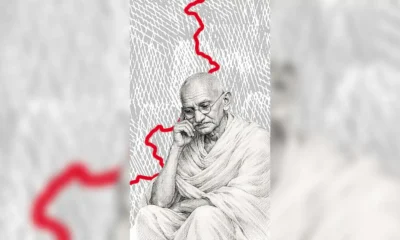
|
Getting your Trinity Audio player ready...
|
(The article was originally published in Indian Express on May 10, 2025 as a part of Dr Madhav’s column titled ‘Ram Rajya’. Views expressed are personal.)
“Doctrine” is a word mostly used in a theological sense. This word with roots in Christianity, meaning a set of beliefs or principles, soon entered military parlance and acquired significance in many countries. Most big countries in the world have certain core principles that guide their military machines, that are called the “strategic doctrine”.
As war rages for the fifth time between India and Pakistan, there is a need to revisit the decades old debate over whether India too should have a doctrinal approach to its national security. I said ‘decades old’ because this debate has been raging in the country for at least two decades, especially after India achieved the significant security milestone of becoming a nuclear power.
Some may argue that our defense forces have all the required strategic operational thinking in place to deal with any security challenge and hence there is no need to bother too much about any doctrine. They also point out that India won three wars with Pakistan without any so-called national security doctrine. We are also successfully thwarting border incursions by China on one side and terrorist incursions by Pakistan on the other. Our military might is increasing with each passing year, and, fortunately, we have a political leadership that is determined to safeguard India’s security interests at all costs. Then why bother about a doctrinal approach?
A national security doctrine is needed precisely for the same reasons. The question that should be asked is not whether we were able to thwart the attacks of the neighbors effectively or not, but whether we can ensure that there won’t be any attacks at all. After all, when we became a nuclear power, we assumed that we acquired ultimate weapon for security. We called it the greatest deterrent. In fact, we articulated a “nuclear doctrine” in 2003 – the only time we perhaps talked about a doctrinal approach – in which we proclaimed that our new status as a nuclear power would mean that we developed “credible minimum deterrence”. Two decades down the line, the so-called deterrence did not stop India’s two nuclear neighbors from continuing to cause tensions and terror. Even the smaller neighbors too do not seem to hesitate to align with India’s enemies adding enhanced security concerns for the country.
China has not fought a single war since its Vietnam War engagement in 1979. Some assume it as China’s weakness or inexperience. On the contrary, there is a strategic doctrine that guides China’s military and political thought, influenced by Sun Tzu’s Art of War. In a profound statement, Sun Tzu says, “To win one hundred victories in one hundred battles is not the acme of skill. To subdue the enemy without fighting is the acme of skill”.
As a country surrounded by two big adversaries, India should develop a doctrinal approach to its security that not only minimizes the threat of war but also enhances its sphere of positive influence. It should not be misunderstood that a doctrine is a permanent guidebook. On the contrary, it only provides certain core principles for achieving specific end goals. The strategy part will vary from time to time.
Problem with India’s policy making is that we are romantic at one level and lazy at another. When we announced our nuclear doctrine in 2003, we declared “No First Use” as the first principle. As the land of Buddha and Gandhi, it suited our national character. But the unfortunate part is that we understood it as passiveness and continued with same policy in all aspects including tackling terrorism. But we are also the land of Krishna, who insisted on having the Maha Bharat War despite the availability of other options like a limited kingdom of 5 villages for Pandavas, which Yudhistir was ready to accept in pursuit of peace. Millennia before John F Kennedy proclaimed that to be prepared for war is the best way to ensure peace, Krishna told Arjuna to be “Yuddhaya Krita Nischaya” – ‘Be resolved to wage war’ – because it was meant not just to defeat the Kauravas but to achieve the end goal of establishing Dharma – the righteous order.
Having such clear end goal is called doctrinal approach. In the absence of that, even “No First Use” remained a romantic notion. When Manohar Parrikar, as country’s defense minister, questioned the principle, it became a controversy. In fact, the same doctrine also says that if India is attacked with nuclear weapons, its response will be “massive and designated to inflict unacceptable damage”. Such an approach to dealing with terrorism and other forms of war – “inflict unacceptable damage” – is the need of the hour, although the public posturing for the sake of the world could still be that our reaction was “focused, measured and non-escalatory”.
That is where the need for a well-crafted national security doctrine comes into picture. There is a misconception that national security is the domain of the police and military. In fact, it is much more than military security. It involves politics, economy and even society and religion. We quote ad nauseum that Chanakya, in his Mandala theory, stated that the immediate neighbor will be your enemy. But he also insisted that a kingdom’s security is as safe as its farthest borders, meaning that the immediate neighbors must be tackled effectively. That is where the role of politics, diplomacy, society and religion comes into picture.
Emperor Ashoka sent Buddhist monks, including his children Mahinda and Sanghamitra, to all neighboring countries to spread Buddhism. History describes it as his contribution to the world of Buddhism. But through that he also helped create a pro-India ring of security around the country to deter any foreign aggressions. That is how a doctrinal approach works.
Without a national security doctrine also, we will win wars. But with a doctrinal approach we can not only avoid wars, like how China did, but also avoid getting re-hyphenated with rogue powers and reneged economically and otherwise. It is time we framed and proclaimed a “National Security Doctrine”.




